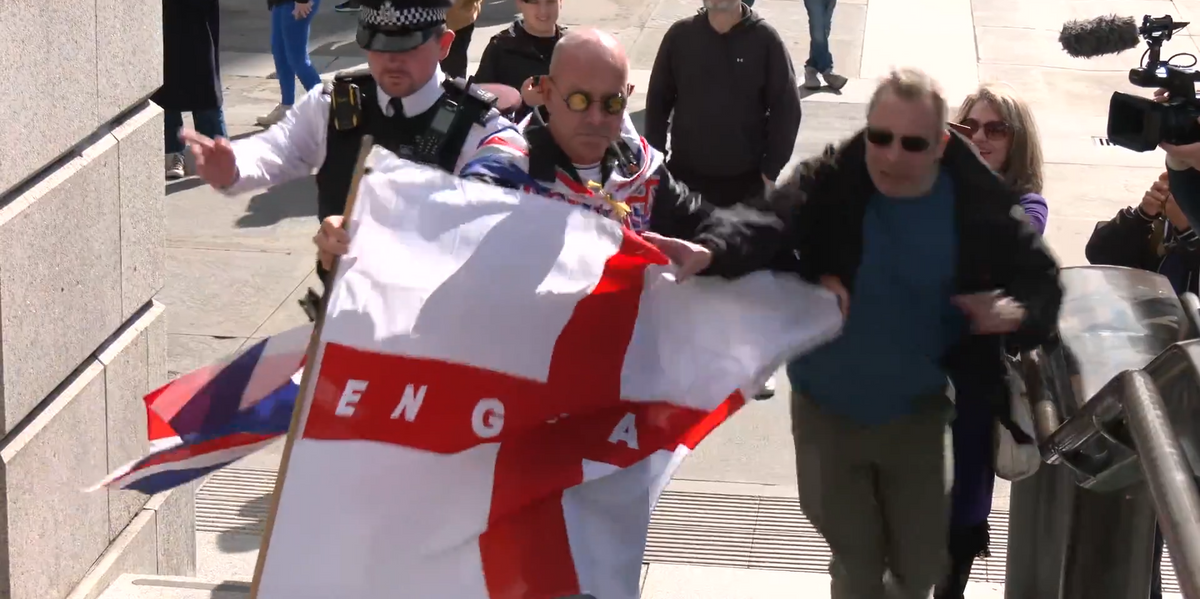Tensions Rise at Trafalgar Square: A Clash of Ideologies
In a vivid display of contrasting ideologies, a protest in Trafalgar Square, London, saw a Stand Up To Racism protestor attempt to snatch a St George’s flag from a member of the Unite the Kingdom group. This incident, which unfolded during an otherwise peaceful demonstration, highlights the growing tensions surrounding immigration and national identity in the UK.
The Incident: A Flag Snatched
The dramatic moment was captured on video, showing the protestor stealthily approaching a member of Unite the Kingdom before making a dash for the England flag. This act of defiance occurred against the backdrop of a larger demonstration, where both groups were voicing their perspectives on immigration and national identity. While the flag theft was a focal point, it was just one of many expressions of the deep-seated divisions within British society regarding these issues.
Voices of Protest: Unite the Kingdom vs. Stand Up To Racism
The protest attracted an estimated 300 participants, with the Stand Up To Racism group chanting, “Say it loud, say it clear – refugees are welcome here.” This slogan encapsulates their message of solidarity with migrants and refugees, countering the narrative that often portrays them as a threat to British culture and society.
Conversely, the Unite the Kingdom group, which gathered around 20 members, held placards with slogans like “Stop illegal immigration” and “Save our culture.” Their presence at the demonstration was marked by a rendition of “Rule Britannia,” a song that has become synonymous with British nationalism. Clare Austin, the founder of Unite the Kingdom, emphasized that their group is often mischaracterized as far-right extremists, asserting, “We’re just mums, sisters, aunts… concerned about how the media and government portray us.”
The Broader Context: Immigration and National Identity
The protests in Trafalgar Square are part of a larger national conversation about immigration, a topic that has become increasingly contentious in recent years. Home Secretary Yvette Cooper addressed this issue during a recent Labour Party conference, stating, “We will not let disorder and violence silence a serious debate on immigration.” Her comments reflect the government’s acknowledgment of the need for a more nuanced discussion amid rising tensions and polarizing rhetoric.
The clash of ideologies at the protest underscores the complexities of national identity in a multicultural society. While one group advocates for welcoming refugees and migrants, the other expresses concerns about cultural preservation and the perceived threats posed by immigration. This dichotomy is not unique to the UK; it mirrors global debates on immigration and national identity, where fear and solidarity often coexist.
The Role of Media and Public Perception
Media portrayal plays a significant role in shaping public perception of these protests and the groups involved. Clare Austin’s remarks about the media’s influence highlight a common sentiment among those who feel marginalized by mainstream narratives. The portrayal of Unite the Kingdom as far-right extremists can alienate individuals who may have legitimate concerns about immigration but do not align with extremist views.
Conversely, the Stand Up To Racism group seeks to challenge these narratives by promoting inclusivity and solidarity with marginalized communities. Their presence at the protest serves as a reminder of the ongoing struggle against racism and xenophobia in society.
Conclusion: A Divided Society
The events at Trafalgar Square serve as a microcosm of the broader societal divisions in the UK regarding immigration and national identity. As both groups continue to voice their concerns, the challenge remains for society to find common ground amidst the discord. The clash of ideologies, exemplified by the attempted flag theft, illustrates the urgent need for dialogue and understanding in a time of heightened tensions.
As the nation grapples with these complex issues, it is crucial for all voices to be heard, fostering a discourse that prioritizes empathy and respect over division and hostility. The path forward will require not only acknowledging the fears and concerns of all parties involved but also striving for a more inclusive and cohesive society.
